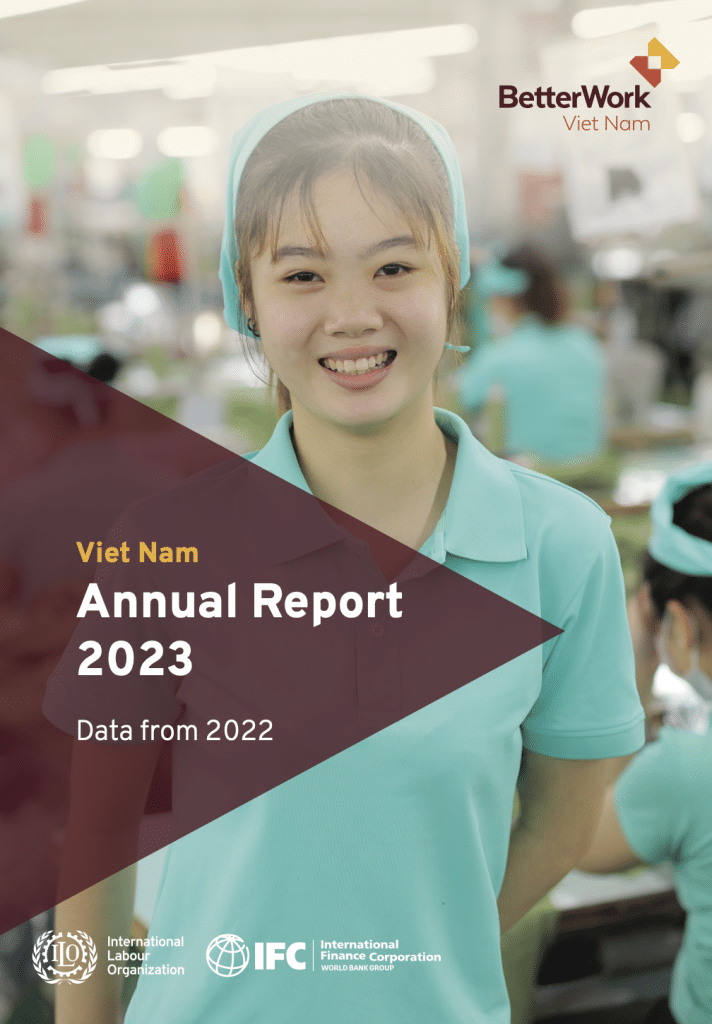This Annual Report shares results from Better Work Viet Nam’s key initiatives and offers compliance snapshots from the garment and footwear industries in 2022.
Insights into compliance and working conditions have been drawn from 293 on-site factory assessments conducted between January and December 2022.
Viet Nam’s garment industry is in a challenging moment, beset by economic strain, operational obstacles and supply chain disruptions. The COVID-19 pandemic continued to impact Viet Nam’s economy in 2022, with the most affected sectors being garments, information and communication, and electronics. Many Vietnamese enterprises ceased operations, reduced their production scale or suffered from the wave of COVID-19 bankruptcies during this time. COVID’s continuing impact was mostly the result of the earlier migration of workers back to their hometowns during the peak of the pandemic, with many having not fully returned to work during the course of 2022.
The pandemic also hindered businesses from reaching their customers, which caused disruptions in global supply chains and jeopardized the employment of workers, and incurred additional costs for COVID-19 prevention. Some factories reported that they had to delay and extend their investment schedules, or even cancel ongoing or future projects because of such disruptions.
The insights gathered from Better Work Enterprise Advisors, who have closely engaged with the 449 surveyed factories, have provided a deeper understanding of the industry’s changing dynamics. A Better Work Viet Nam survey of 449 participating factories in November 2022 showed that businesses in the apparel and footwear industries had slowed production in the third quarter of 2022 in the face of falling orders. These shortfalls in production orders occurred mostly in the small- and medium-sized enterprises that provide printing, embroidery, dyeing, spinning, knitting and woven products for garment firms.
While progress has been made, particularly in the area of environmental sustainability, challenges remain. These include market fluctuations and supply chain issues, which must be addressed for continued growth and sustainability. The report serves as a crucial tool for stakeholders to understand the landscape and act accordingly.
In a statement marking the release of the Better Work Viet Nam Annual Report 2023, the Program Advisory Committee (PAC) of Better Work Viet Nam recognised the practical and effective support that Better Work has provided to factories in maintaining compliance with labour laws and promoting social dialogue to help mitigate the impacts of declining aggregate demands in major export markets.
The PAC, which comprises representatives from Vietnam’s Ministry of Labour – Invalids and Social Affairs (MoLISA), the Vietnam Chamber of Commerce and Industry (VCCI), and the Vietnam General Confederation of Labour (VGCL), also called upon stakeholders to continue making progress in improving working conditions in Viet Nam’s garment sector.
“We express our support for the Better Work Viet Nam programme and call upon all stakeholders to continue to help make progress in improving working conditions in Vietnam’s garment sector,” said Nguyen Tien Tung, Chief Inspector, Ministry of Labour – Invalids and Social Affairs, and also the Chairperson of Better Work Viet Nam Program Advisory Committee (PAC).
Launched in 2009, Better Work Viet Nam operates in 426 garment and 44 footwear factories nationwide, employing over 750,000 workers as of December 2022. The programme employs a multifaceted approach encompassing assessments, advisory services, and training at the factory level, while also hosting industry seminars to foster cross-sector learning.
